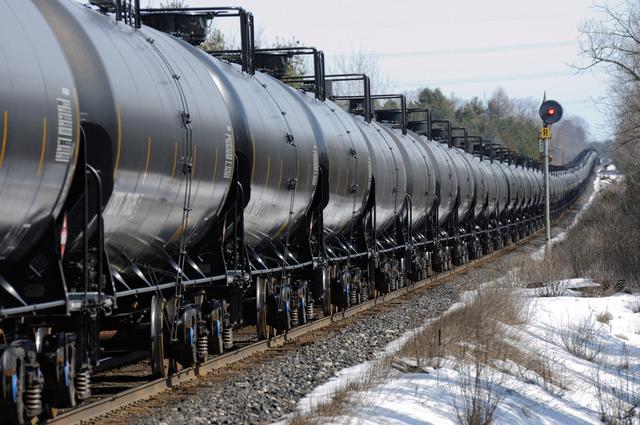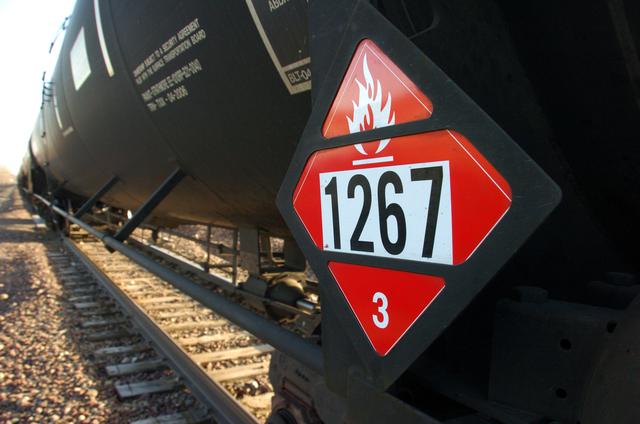Friday, 20 June 2014 08:02
Fracking Train Shipments Allegedly Delay Amtrak Trains and Passengers for Hours Everyday
Add this to another adverse side effect of fracking: On some major (and secondary routes), long freight trains filled with fracking oils and extraction supplies allegedly delay Amtrak trains for hours, enraging passengers and likely decreasing Amtrak usage on the affected routes.
Although a quick Google search of Amtrak and fracking reveals that this disruption due to fracking shipments has occurred in various parts of the nation, the most affected route appears to be the Empire Builder, which runs from Seattle to Chicago. Indeed, the Midwest Amtrak PR representative, Mark Maglari, referred BuzzFlash at Truthout to an Amtrak service alert warning passengers of delays on the Empire Builder route:
Passengers traveling aboard Empire Builder trains can encounter significant delays due to very high volumes of freight train traffic along the route. During the previous weeks in May and June, delays averaged between three and five hours. While delays to the Empire Builder have primarily been occurring west of St. Paul, MN, passengers should anticipate delays in both directions.
Maglari pointed out what is confirmed by other sources: BNSF Railway Company owns the tracks that Amtrak uses in North Dakota. Given that the tracks are the property of BNSF, it decides which trains have de facto priority passage (even though a federal law is supposed to give priority to Amtrak), and it has allegedly given fracking and oil container car shipments passage scheduling times that impede the passage of Amtrak passenger trains (and, apparently, trains carrying farm goods that are perishable).
We asked several questions in a phone conversation Friday morning with an amiable BSNF PR spokesperson, Roxanne Butler, who sent an e-mail response denying that fracking shipments, per se, are causing the Empire Builder to run hours behind schedule:
BNSF is spending nearly $1 billion this year adding track in the northern corridor because of all the increased business. A combination of seasonal weather conditions along with maintenance and new construction projects have combined to cause slowing trains, but ultimately BNSF expansion projects will pay off in more track capacity for both passenger and freight trains. BNSF is not delaying Amtrak trains in favor of freight trains. Freight trains have been significantly affected as well.
Please know that the information you heard about the crude oil trains being the cause of delays for Amtrak is false. Those trains have also been impacted by the growing pains.
Butler included a news release detailing BNSF's ongoing investment in railroad line expansion in congested corridors.
Amtrak's Maglari would only confirm that the rail traffic congestion was causing the nearly daily Empire Builder delays of several hours, but punted the question of fracking shipments causing them to BNSF. Maglari, however, acknowledged that farmers were protesting that their crops were facing ruin due to rail shipment delays.
An April 10 Reuters article reported on a federal government agency hearing on the farmer hardship disruptions caused by fracking shipments:
Midwestern farmers and Amtrak passengers are among those being hurt by rail congestion caused in part by an energy boom that has spurred the massive movement of oil by rail, U.S. officials were told on Thursday.
Rail shipments of oil have been on the rise in regions that lack sufficient pipelines as alternatives, such as North Dakota’s Bakken energy patch, where production is nearing 1 million barrels per day and roughly 72 percent of that fuel moves on the tracks.
Rail lines clogged with 100-car trains carrying oil heading to refineries, as well as coal hoppers bound for export terminals, help explain why passengers are often delayed and farm commodities are late to market, witnesses told the Surface Transportation Board, a regulatory agency that arbitrates rail disputes.
“Increased volumes of oil and coal shipments have displaced grain shippers leading to long, expensive delays,” said Roger Johnson, president of the National Farmers Union.
Weeks can pass before trains reach grain farmers in Montana and the Dakotas, Johnson said, easily leading to thousands of dollars of losses per farm family.
Furthermore, an Amtrak operation spokesperson told Reuters: “There is great concern that the problem is not going to get better. It is going to get worse."
In 2011, a poster on an Amtrak discussion board predicted the current crisis on the Empire Builder route:
Bakken Shale oil extraction activity west of Minot. Much of this oil will be shipped by unit trains, and the loop tracks to load oil are under construction now. At the moment delays are occurring because shipments of pipe and fracking sand are set out on sidings for transloading, thus preventing meets on these sidings. In the future there will be unit oil trains adding to congestion on the line.
Although Maglari asserted that Amtrak's top concern is passenger satisfaction and that it was vigorously working with BNSF to end the long delays, there have been few signs of the disruptions ending anytime soon.
This past Wednesday, a Truthout staffer was going to pick her husband up from Chicago's Union Station. He was returning to the city on the Empire Builder. She called Amtrak first to find out if his train was on time and was told it would be 17 hours late. When she was asked what was the cause of the delay, she was told (and this is a paraphrase): "It's that fracking. Nearly everyday that fracking up in North Dakota is making the train late."
Maglari when told of the exchange with the Amtrak agent responded more or less (as paraphrased), "The agent wasn't sticking to the Amtrak talking points."
So add Amtrak getting fracked to your list of reasons to oppose the process that injects toxic chemicals into the earth, releases methane (that is estimated to be 34 times more potent than carbon emissions, according to the EPA) and generally is destructive to life as we know it.
Copyright, Truthout. May not be reprinted without permission
"During the previous weeks in May and June, delays averaged between three and five hours."
Crude Oil



